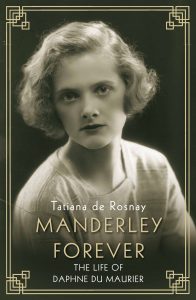 Published by Allen & Unwin 5 October 2017
Published by Allen & Unwin 5 October 2017
Hardback, 352pp, £18.99
Reviewed by Jessica Mann
“Why wasn’t I born a boy?” the young Daphne du Maurier demanded. Born in 1907, she was not at all unusual in recognizing that females had far less fun, freedom and opportunity than their brothers. Until the days of women’s liberation in the second half of the twentieth century, a great many girls wished they were boys, though rather fewer believed, as Daphne did until her late teens, that she was in fact a boy imprisoned in a girl’s body. In the end she resigned herself to life as a member of the inferior sex. But she always felt ‘a permanent emptiness that continued to gnaw at her.’
The biographical facts are well known: after an unusual childhood as the daughter of a world famous  actor, Daphne was a troubled adolescent and a discontented young adult. Then she escaped to Fowey in Cornwall, published her first novel at the age of twenty-four, married Boy Browning, an army officer, and had two daughters and a son. And all the time she was writing. There were several best sellers before Rebecca, the book that made her famous. Its power derives partly from the raw emotion about the house in which it is set. The description of Manderley reflects Daphne’s feelings for the love of her life: Menabilly, a derelict manor house, leased to the Brownings by the Rashleigh family.
actor, Daphne was a troubled adolescent and a discontented young adult. Then she escaped to Fowey in Cornwall, published her first novel at the age of twenty-four, married Boy Browning, an army officer, and had two daughters and a son. And all the time she was writing. There were several best sellers before Rebecca, the book that made her famous. Its power derives partly from the raw emotion about the house in which it is set. The description of Manderley reflects Daphne’s feelings for the love of her life: Menabilly, a derelict manor house, leased to the Brownings by the Rashleigh family.
‘It makes me a little ashamed to admit it but I do believe I love Menabilly more than people,” Daphne declared, and moving out after twenty five years broke her heart. She stayed in Cornwall, and, with her son, published a polemic about the destruction of local traditions. Yet Daphne had ignored tradition all her life, remaining in Cornwall rather than accompanying her husband on his various postings, conducting lesbian love affairs (with, among others, Gertrude Lawrence) and wearing trousers and even trouser suits long before they were regarded as acceptable. ‘It’s people like me who have careers who really have bitched up the old relationship between men and women. Women ought to be soft and gentle and dependent. Disembodied spirits like myself are all wrong.’
At least eight books about Daphne du Maurier have been published since she died in 1989, the best of them being Margaret Forster’s authorized biography. Tatiana de Rosnay tells the familiar story in the present tense, making psychological inferences, imagining her subject’s thoughts and feelings in a way that could seem intrusive but is actually very persuasive. I did not expect to learn anything new from de Rosnay’s version, and nor did I, but much enjoyed reading it. Rebecca is De Rosnay’s favorite novel, du Maurier her favourite writer, ‘an unusual and enchanting novelist, scorned by critics because she sold millions of books.’ Writing Manderley Forever was a labour of love.
